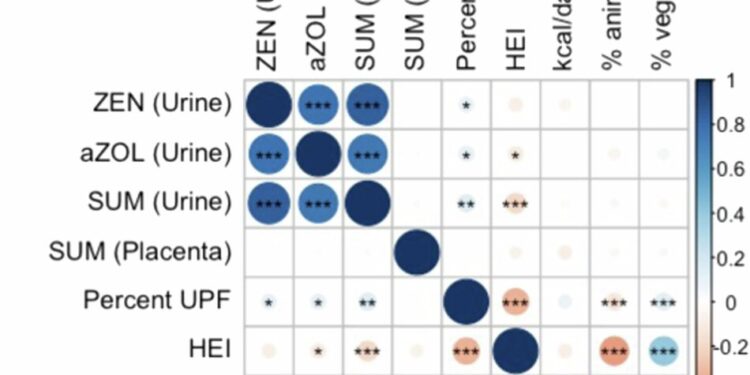Spearman correlation between log-transformed mycoestrogen concentration in urine (ng/ml) and placenta (ng/g) and dietary parameters in the UPSIDE cohort. The N number for urine measurements is 258 (3 measurements per person), placental measurement is 271, dietary measurements are 172. Significance is indicated by *(p < 0.05), **( p < 0.01), ***(p < 0.01). 0.001). aZOL alpha-zearalenol, kcal kilocalories, HEI healthy eating index, UPF ultraprocessed foods, sum of mycoestrogen analytes, ZEN zearalenone. Credit: Journal of Exposure Science and Environmental Epidemiology (2024). DOI: 10.1038/s41370-024-00722-6
A study published in the Journal of Exposure Science and Environmental Epidemiology found that almost all pregnant women ingest the fungal toxin zearalenone (ZEN), which mimics estrogen in the body and hinders reproduction in some animals.
Researchers at Rutgers and the University of Rochester detected ZEN or its metabolites in 97% of urine samples from pregnant women and 84% of placentas.
ZEN is a type of mycoestrogen, an estrogen-like compound produced by certain molds that contaminate grains, meats, and processed foods worldwide. It is most common in crops such as corn, wheat and barley. Although well studied in animals, where it can cause reproductive problems, less is known about its effects in humans.
“We are only at the beginning of studying how these compounds affect the human body at all stages of development,” said Zorimar Rivera-Núñez, assistant professor at the Rutgers School of Public Health and author principal of the study.
ZEN is so structurally similar to the hormone 17β-estradiol that it binds to estrogen receptors. Large doses reduce the number and size of offspring in cattle, pigs, mice and rats. Paradoxically, these compounds also promote growth in livestock after birth, so much so that American farmers routinely feed livestock a synthetic version of ZEN.
To study exposure levels during pregnancy, researchers collected urine samples from 317 women in Rochester, New York. They also collected 271 placenta samples and asked study participants about their lifestyle choices, such as their usual diet.
Women with a higher body mass index and those who had already given birth tended to have higher levels of ZEN in their urine.
Diet also affected exposure. Women with healthier diets, particularly those who ate more protein and vegetables, had lower exposure levels. Diets high in ultra-processed foods were associated with increased ZEN concentrations.
“For every 1 percent increase in consumption of ultra-processed foods, there was a higher exposure to mycoestrogens,” said lead author Carolyn Kinkade, who studied zearalenone for her doctorate. thesis in the Exposure Science program at the Rutgers School of Graduate Studies.
The study comes amid growing concerns about endocrine-disrupting chemicals in the environment. Unlike many of these other chemicals, ZEN has long been present in our foods, but its exposure may be increasing due to modern food production and climate change.
“This is an exposure related to climate change,” Rivera-Núñez said. “Current data on mycotoxins predict that levels of these chemicals will increase as temperatures and weather warm.”
Some cellular studies suggest that ZEN may be more potent than other known endocrine disruptors such as BPA or phthalates. However, its effects on human health remain unclear. Previous research by the team found associations between ZEN exposure and altered sex hormone levels in pregnant women and umbilical cord blood.
Researchers continue to study potential health impacts. Future studies will examine associations with pregnancy weight gain, placental development, and child growth and development.
“In the future, we would like to expand what we are currently doing to look at children’s health through puberty,” Rivera-Núñez said.
For now, the findings may provide another reason to eat healthily during pregnancy, the researchers said, although they noted that ZEN is so prevalent in foods that we would need to create regulations aimed at controlling the presence of mycoestrogens in the food chain. reduce exposure of the population.
“People who want to reduce their exposure can do so by reducing their consumption of ultra-processed foods overall,” Kinkade said.
More information:
Carolyn W. Kinkade et al, Sociodemographic and dietary predictors of maternal and placental mycoestrogen concentrations in a US pregnancy cohort, Journal of Exposure Science and Environmental Epidemiology (2024). DOI: 10.1038/s41370-024-00722-6
Provided by Rutgers University
Quote: Study finds widespread exposure to hormone-disrupting chemicals during pregnancy (October 16, 2024) retrieved October 16, 2024 from
This document is subject to copyright. Except for fair use for private study or research purposes, no part may be reproduced without written permission. The content is provided for informational purposes only.



